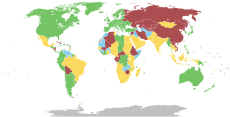United Nations General Assembly Resolution ES-11/3
| UN General Assembly Resolution ES-11/3 | |||||||||||
|---|---|---|---|---|---|---|---|---|---|---|---|

| |||||||||||
| Date | 7 April 2022 | ||||||||||
| Meeting no. | 11th Emergency Special Session (continued) | ||||||||||
| Code | A/RES/ES-11/3 (Document) | ||||||||||
| Subject | Aggression against Ukraine | ||||||||||
Voting summary |
| ||||||||||
| Result | Resolution adopted | ||||||||||
United Nations General Assembly Resolution ES‑11/3 is a resolution of the eleventh emergency special session of the United Nations General Assembly, adopted on 7 April 2022. The resolution suspended the membership of Russia in the United Nations Human Rights Council over "grave concern at the ongoing human rights and humanitarian crisis in Ukraine [...] including gross and systematic violations and abuses of human rights" committed by Russia, and was passed with 93 votes in favour, 24 against, and 58 abstentions.[1]
Background
On 1 April 2022, video footage of the Bucha massacre became public, linking the massacre to the Russian Armed Forces.[2] On 4 April, citing the Bucha massacre, US Ambassador to the United Nations Linda Thomas-Greenfield announced that the United States would seek the removal of Russia from the UN Human Rights Council.[3] At the time, Russia was serving a three-year elected term on the Council.[4]
Draft resolution A/ES-11/L.4 was introduced on 6 April 2022.[5][6] Previously, only Libya had had its membership rights stripped from the body, as a result of the actions of the Gaddafi regime against anti-government protestors in 2011.[7][8] Prior to the vote, the Russian delegation to the United Nations privately circulated a letter urging countries not to vote in favour or to abstain on the resolution, stressing that doing so would impact bilateral relations.[9]
Vote
On 7 April 2022, the UN General Assembly, which required a two-thirds majority, adopted the resolution with 93 votes in favour and 24 countries voting against.[1] 58 countries abstained. The Russian delegation subsequently announced it would quit the Human Rights Council.[1]
See also
References
- ^ a b c Nichols, Michelle (7 April 2022). "U.N. suspends Russia from human rights body, Moscow then quits". Reuters. Retrieved 8 April 2022.
- ^ Ough, Tom (4 April 2022). "Debunking Russia's Bucha massacre conspiracy theories". The Telegraph. ISSN 0307-1235. Retrieved 8 April 2022.
- ^ McGRATH, Stephen (5 April 2022). "US to seek Russia's suspension from Human Rights Council". ABC News. Retrieved 8 April 2022.
- ^ "UN votes to suspend Russia from its Human Rights Council despite opposition". Deutsche Welle (DW). 7 April 2022. Retrieved 8 April 2022.
- ^ "UN to Vote on Expelling Russia from Human Rights Council". VOA. Retrieved 8 April 2022.
- ^ "Suspension of the rights of membership of the Russian Federation in the Human Rights Council : draft resolution". UN Digital Library. Retrieved 8 April 2022.
- ^ "Russia suspended from human rights council after UN general assembly vote". the Guardian. 7 April 2022. Retrieved 8 April 2022.
- ^ "UN suspends Libya from Human Rights Council". France 24. 1 March 2011. Retrieved 8 April 2022.
- ^ "Russia threatens states with consequences over UN vote on Human Rights Council". www.euractiv.com. 7 April 2022. Retrieved 8 April 2022.
- ^ Guterres, António (27 February 2022). "Letter dated 27 February 2022 from the Secretary-General addressed to the President of the General Assembly".
